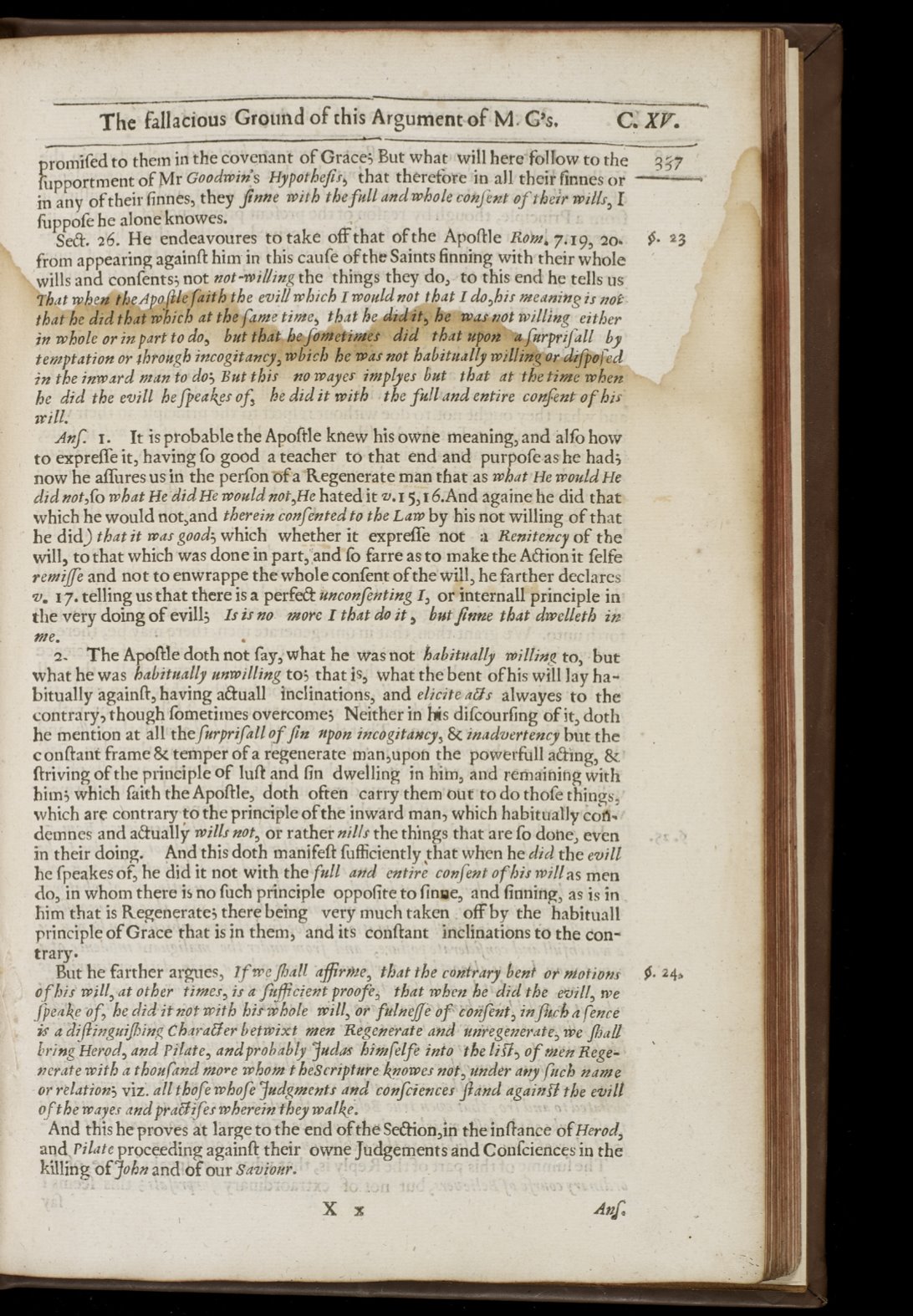

The
fallacious
Ground
of
chis
Argument
of
M.
G's.
C
XV
promifed
to
them
in
the covenant
of
Grace;
But
what
will
here follow
to
the
357
fupportment
of
Mr
Goodwin's
Hypoth.
efir,
that
therefore
in all
their fnnes or
in any
oftheir
finnes,
they finne
with
the
full
and
whole
coif-bit
of
their
mills,
I
fuppofe he
alone knowes.
Se
&.
26.
He endeavoures
to
take
off
that ofthe
Apoftle
Rom.
7.19,
20.
S.
23
from
appearing againft him
in
this caufe
of
the
Saints finning
with their whole
wills
and confents;
not
not
-
willing
the
things they
do, to
this
end
he
tells us
That when theApofile
faith
the
evill
which
I
would not
that
I
do,his meaning
is
not
that
he
did that
which
at
the
fame time,
that
he
did
it,
he was not
willing either
in
whale
or inpart
to
do,
but
that
he
fometimes
did that
upon
a
firprif
ä1l by
temptation
or through incogitancy, wbich
he
was not
habitually willing
or
difpojed
in
the
inward
man
to
do; But
this
no wayes implyes
but
that
at
the time
when
he
did
the
evill
he
fpeakes
of
he
did
it
with
the
full
and
entire confent
of
his
will.
Anf
r.
It
is
probable the
Apoftle
knew
his
owne meaning,
and
álfo
how
to
expreffe
it,
having
fo
good
a
teacher
to that
end and purpofe
as
he
had;
now he
affures
us
in
the
perfonufa
Regenerate man
that
as what
He
would
He
did
not,fo what
He
did
He
wouldnot,He
hated
it
v.'
5,t
6.And
againe he did
that
which he
would not,and
therein
contented
to
the Law
by his
not willing
of
that
he
did)
that
it
was good;
which
whether
it
expreffe
not
a
Renitency
of
the
will,
to
that
which was
done
in
part,';and
fo
farre
as
to
make the
A
&ion
it
felfe
remiffe
and
not to
enwrappe
the
whole confent
of
the will,
he
farther
declares
v,
17.
telling
us
that
there
is
a perfe&
unconfenting
i,
or
internall principle
in
the
very doing
of
evill; Is
is
no
more
I
that
do
it,
but
fine
that
dwelleth
in
me.
2.
The
Apoftle
doth
not
fay,
what he
was
not
habitually willing
to,
but
what
he was habitually unwilling
to; that
îs,
what
the
bent
of
his
will lay
ha-
bitually
againft, having
a
&wall
inclinations, and
elicite
aCis
alwayes
to the
contrary, though
fometimes overcome;
Neither
in his
difcourfing
of
it,
doth
he mention at all
the
furprifall
of
fin
upon
incogitancy,
&
inadvertency
but the
conftant
frame& temper
of
a
regenerate man,upon
the
powerfull
a&ing,
&
ftriving
of
the principle
of
luft and
fin
dwelling
in
him, and remaining
with
him;
which faith
the
Apoftle,
doth
often carry them
out
to
do
thofe things,
which are
cbntraryto
the
principle
of
the inward man,
which
habitually con.
demnes
and
actually wills
not,
or rather
nills
the
things
that
are
fo
done; even
in
their doing.
And
this
Both manifeft fufficiently
that
when he
did
the
evill
he fpeakesof, he
did it
not
with the full and
entire
confent
o
f
his
will
as
men
do,
in
whom
there
is
no
fuch
principle oppofite
to
finne,
and
finning,
as
is in
him
that
is
Regenerate; there
being very much
taken
off
by the habituall
principle
of
Grace
that
is
in
them, and
its
conftant
inclinations
to the
con-
trary.
But
he
farther
argues,
if
we
fisall
afrme,
that
the
contrary bent
oe
motions
O.
24.
of
hi
s
will,
at
other times,
is a
fìfcient
proofe,
that
when
he
did
the evill,
we
f
pe
eke
of,
he
did
it
not with his
whole
will, or fulneffe
of
confent,
infilch
a
fence
is a
di,
flinguifhing
Charatler betwixt
men
Regenerate
and
unregenerate,
we
(hall
bring Herod,
and Pilate, and
probably yudas
him
felfe
into the
fill, of
men Rege-
nerate with
a
thoufand
more whom
theseripture
Inowes
not, under
any
fuch
name
or
relation; viz.
all
thofe whole
judgments
and
confciences
fiend
again
fi
the
evill
of
the
wayes
and
pratli
fer
wherein
they
walk'.
And this he
proves
at large
to the
end
ofthe
Se&ion,in
the
inflance
of
Herod,
and
Pilate
proceeding againft
their
owne Judgements andConfciences
in
the
killing
of
John
and
of
our
Saviour.
X
x
Anf,










